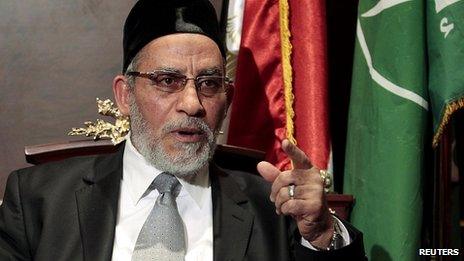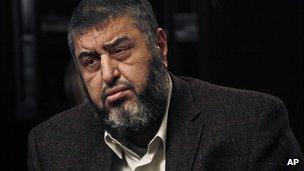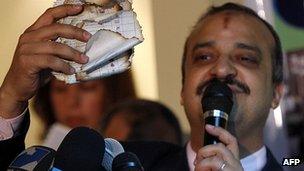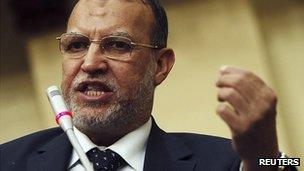Who's who in Egypt's Muslim Brotherhood
- Published

Mohammed Badie succeeded Mohammed Mahdi Akef as the Brotherhood's leader in 2010
Many leading members of Egypt's Muslim Brotherhood were detained as part of the crackdown on the organisation following the overthrow and arrest of President Mohammed Morsi in July. Some initially evaded arrest but were detained later.
Other members have come to represent the public face of the Islamist movement by appearing at pro-Morsi rallies or in international media. Here are some of the movement's key figures:
Mohammed Badie
Mohammed Badie is the Muslim Brotherhood's General Guide and in theory its leading figure.
He was born in al-Mahalla al-Kubra, north of Cairo, in 1943, and is a veterinary pathologist by training. He has taught in several Egyptian universities.
He held a number of administrative roles in the Brotherhood and served lengthy jail terms for his political activities, before assuming the leadership in 2010.
In the early stages of the protests, he appeared on the main stage of the Brotherhood's sit-in in Cairo. His remark in late July that "overthrowing Morsi was more criminal than carrying an axe and demolishing the Kaaba in Mecca" stirred controversy.
His arrest was ordered on 10 July on charges of inciting the killing of anti-Morsi protesters, and a travel ban was put in place.
He went on the run but was arrested on 20 August, days after his son, Ammar, was killed in the Cairo unrest.
On 28 April, a judge recommended that Mr Badie should face the death penalty alongside the 682 other Muslim Brotherhood supporters he was on trial with.
Mahmoud Ezzat
A leading figure in the Brotherhood since the 1960s, Mahmoud Ezzat has been described as "the gatekeeper" of the group's finances and secrets.
He joined the Brotherhood when he was 18 years old and rose through the ranks to become deputy guide in 2010. Described by Egyptian newspaper Al-Ahram as a "hardliner" within the organisation, he has been imprisoned several times and served time alongside other members, including Mr Badie and Khairat al-Shatir.
He was made temporary leader of the Brotherhood following the arrest of Mr Badie in August.
Despite his leading role, he has kept a low profile and in December 2012 was singled out as the organisation's "most dangerous man" by academic Sa'd al-Din Ibrahim, who described him as a "big enigma".
Khairat al-Shatir

Khairat al-Shatir
The engineer, businessman and Islamist political activist has been seen as one of the group's most influential figures.
Imprisoned under former President Hosni Mubarak, he was the Brotherhood's initial candidate in last year's presidential elections before being disqualified by the election commission.
He is the deputy General Guide and thought to be a main financier of the group.
Mr Shatir was arrested on 5 July 2013, after Mohammed Morsi was ousted, and his assets frozen.
Mohammed al-Beltagi

Mohammed al-Beltagi
The secretary-general of the Brotherhood's Freedom and Justice Party (FJP) and former MP was an activist on board the ship the Mavi Marmara during the 2010 Gaza flotilla raid.
On 10 July, prosecutors ordered Mr Beltagi's arrest, and four days later they ordered that his financial assets be frozen.
Despite the arrest order, Mr Beltagi appeared on an almost daily basis at the Rabaa al-Adawiyah sit-in, delivering fiery speeches on the stage.
He was eventually detained in a suburb of Giza on 29 August.
Criticism of the Muslim Brotherhood in the Egyptian media has focused on Mr Beltagi, who has been accused of being behind acts of violence allegedly perpetrated by Brotherhood members.
Gehad al-Haddad
The son of Mr Morsi's foreign affairs adviser Isam al-Haddad, Mr Haddad is a senior adviser and media spokesman for the Brotherhood. He studied at De Montfort University in the UK and is fluent in English.
Mr Haddad served as media strategist for Mr Morsi's presidential campaign in 2011, and is active with foreign media, giving interviews in English for BBC World, Sky News, The Guardian and CNN, and tweeting as @gelhaddad.
He was arrested in Cairo on 17 September.
Ahmad Arif
The Brotherhood's Arabic media spokesman is a dentist and an expert in Islamic and Christian theology. His appointment was well-received by the media, given his soft tone and moderate style, which earned him regular spots on TV talk shows.
Mr Arif appeared regularly at the Rabaa sit-in, delivering speeches from the stage. He was detained by security services on 22 August.
Abd-al-Rahman al-Barr
Often described as the "Muslim Brotherhood's Mufti", Mr Barr is the organisation's most senior religious figure and a member of the Brotherhood's Guidance Bureau. He has not been detained and has often led prayers at pro-Morsi sit-ins.
Essam el-Erian

Essam el-Erian
A vice-chairman of the FJP and former member of the Guidance Bureau, Essam el-Erian was arrested on 30 October, after evading authorities for months.
While in hiding, Mr Erian urged Muslim Brotherhood supporters to keep up protests against the military and demand Mohammed Morsi's reinstatement.
A regular guest in domestic and foreign media before the crackdown, he stirred controversy over remarks in which he called Israel "a racist, invading entity that commits war crimes" and urged Egyptian Jews in Israel to come back.
He also drew criticism over remarks quoted in Al-Ahram, reportedly saying: "Tell [the UAE] that nuclear Iran is coming... The Persians are coming, not the Egyptians, and you will become slaves of the Persians."
BBC Monitoring, external reports and analyses news from TV, radio, web and print media around the world. For more reports from BBC Monitoring, click here. You can follow BBC Monitoring on Twitter , externaland Facebook, external.